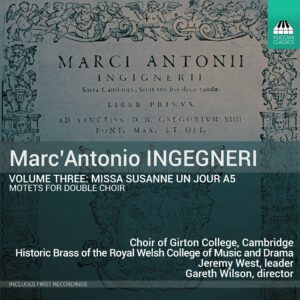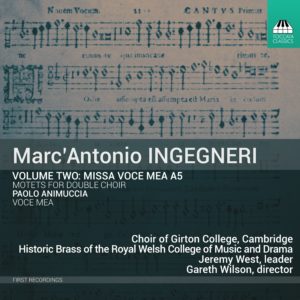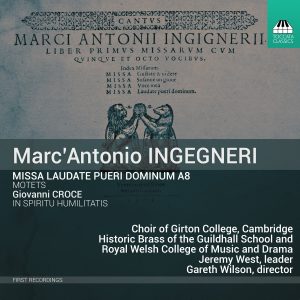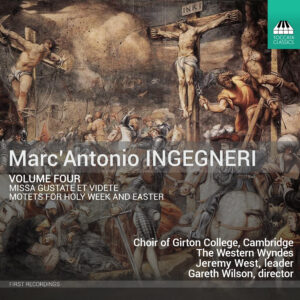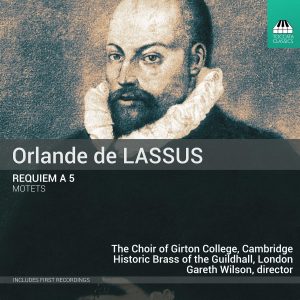Search Results for "Girton"
Marc’ Antonio Ingegneri, Volume Three: Missa Susanne un jour a5
The Cremonese composer Marc’Antonio Ingegneri (c. 1535/36–92) is chiefly remembered as the teacher of Claudio Monteverdi while, for well nigh 500 years, his own achievements were left to sit in the shadows. This third in a series of pioneering recordings from the Choir of Girton College, Cambridge, reveals Ingegneri to have been one of the masters of his age, writing music of breathtaking richness and beauty: the works heard here combine learned, intricate counterpoint with the kind of sheer sonic thrill that brings a shiver of physical excitement. It is, of course, religious music, but it is also extraordinarily passionate, to a degree not previously heard, nor for centuries to come, until the rise of the great Romantic choral works.
Choir of Girton College, Cambridge (1, 2, 4–6, 9–12, 16)
Historic Brass of the Royal Welsh College of Music and Drama (1–7, 9–14)
Jeremy West, leader (3)
Emily Nott, organ (8)
Felix Elliott, organ (15)
Gareth Wilson, director
Marc’Antonio Ingegneri: Volume Two: Missa Voce Mea A5, Motets for double choir
The Cremonese composer Marc’Antonio Ingegneri (c. 1535/36–92) is chiefly remembered as the teacher of Claudio Monteverdi, while, for well-nigh 500 years, his own achievements were left to sit in the shadows. This second in a series of pioneering recordings from the Choir of Girton College, Cambridge, reveals Ingegneri to have been one of the masters of his age, writing music of breathtaking richness and beauty: the works heard here combine learned, intricate counterpoint with the kind of sheer sonic thrill that brings a shiver of physical excitement. It is, of course, religious music, but it is also extraordinarily passionate, to a degree not previously heard, nor for centuries to come, until the rise of the great Romantic choral works.
Choir of Girton College, Cambridge (Tracks 1–3, 5–8, 10, 12–14)
Historic Brass of the Royal Welsh College of Music and Drama (Tracks 1, 3–14)
Jeremy West, leader
Gareth Wilson, director
Marc’Antonio Ingegneri: Missa Laudate pueri Dominum
The Cremonese composer Marc’Antonio Ingegneri (c. 1535/36–92) is chiefly remembered as the teacher of Claudio Monteverdi while, for well nigh 500 years, his own achievements were left to sit in the shadows. This pioneering recording reveals Ingegneri to have been one of the masters of his age, writing music of breathtaking richness and beauty: the polychoral works heard here combine learned, intricate counterpoint with the kind of sheer sonic thrill that brings a shiver of physical excitement.
Choir of Girton College, Cambridge
Historic Brass of the Guildhall School and Royal Welsh College of Music and Drama
Jeremy West, leader
James Mitchell and Wayne Weaver, organ
Gareth Wilson, director
First recordings
Manuel Cardoso: Missa Secundi Toni and Other Works
Manuel Cardoso (1566–1650) was one of the most important composers of the golden age of Portuguese polyphony around the turn of the seventeenth century. But modern choirs have been surprisingly slow to explore the rich legacy of his compositions: this is the first recording of his Missa Secundi Toni, and the first of any of his works with brass consort, its dark colours providing an effective contrast with the young voices of the Girton College Choir.
The Choir of Girton College, Cambridge (Tracks 1–2, 4–7)
Historic Brass of the Royal Academy of Music (Jeremy West, leader) (Tracks 1–5, 7 10–14, 16–17)
Lucy Morrell, organ (Tracks 1–5, 7–8, 10–13, 15–17)
Gareth Wilson, director (Tracks 1–7, 9–14, 16–17)
Palestrina: Missa sine nomine a6
Renaissance polyphony is generally held to be stately, calm, reassuring. But this pro- gramme of Palestrina’s six-part Missa sine nomine, complemented by five of his motets and three by Marc’Antonio Ingegneri (c. 1535/36–92), was recorded after the Choir of Girton College, Cambridge, had undertaken a tour of Israel and Palestine. There the music and its texts (‘How shall we sing the Lord’s song in a strange land?’) took on an extraordinary poignancy, with the dispossession and desperation of thousands of years ago animating the restrained dignity of Palestrina’s counterpoint with an unexpectedly topical intensity.
Choir of Girton College, Cambridge
Historic Brass of the Guildhall School and Royal Welsh College of Music and Drama
Jeremy West, leader
James Mitchell, organ (Track 8)
Lucy Morrell, organ (Track 13)
Gareth Wilson, director
Marc’Antonio Ingegneri: Volume Four – Missa Gustate et videte; Motets for Holy Week and Easter
The Cremonese composer Marc’Antonio Ingegneri (c. 1535/36–92) is chiefly remembered as the teacher of Claudio Monteverdi while, for well-nigh 500 years, his own achievements were left to sit in the shadows. This fourth in a series of pioneering recordings from the Choir of Girton College, Cambridge, presents a sequence of music for Holy Week and Easter, confirming Ingegneri to have been one of the masters of his age. The striking range of moods heard here will confound conventional expectations of Renaissance polyphony: Ingegneri’s emotional palette extends from tender intimacy in some of these motets to dancing, celebratory jubilation in the Mass setting – all of it music of breathtaking richness and beauty.
Choir of Girton College, Cambridge
The Western Wyndes
Jeremy West, leader
Gareth Wilson, director
Orlande de Lassus: Requiem a 5; Motets
Lassus’ five-part setting of the Requiem is rarely heard; here it is recorded with brass for the first time, the sombre colours of the sackbuts further darkening the tone. Interweaving a number of motets, some also receiving first recordings, and a madrigal on death by one of Lassus’ contemporaries in an organ transcription, this innovative programme takes the listener on a spiritual journey, through the darkness of bereavement to the elevation of the Christian soul after death.
The Choir of Girton College, Cambridge (Tracks 1-4, 6-10, 12-14, 17)
Historic Brass of the Guildhall, London
(Jeremy West, leader) (Tracks 2-8, 10, 12-14, 17)
Lucy Morrell, organ (Tracks 3, 4, 6-8, 10-13, 16, 17)
Gareth Wilson, director
Stay In the Know
JOIN THE TOCCATA NEWSLETTER
"*" indicates required fields
By visiting our site, you agree to our privacy policy regarding cookies, tracking statistics, etc.
